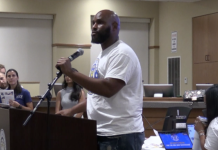The Jersey City Council sought to fine tune a mandatory minimum fine ordinance for negligent landlords at yesterday’s caucus meeting.

By Daniel Ulloa/Hudson County View
Landlord/Tenant Relations Office Director Shyrone Richardson said he met with Ward E Councilman James Solomon’s office about the ordinance up for second reading (he introduced three earlier this month that were all approved unanimously).
“ … When these resolutions were first submitted for first reading, I really hadn’t had a conversation with anybody. My concern was that… I wanted to make sure it didn’t add more burden to my department,” Richardson explained.
“When I first got to the office, five people were reviewing about 700 registrations a year. That number has moved up to 1,700. But now we’ve lost three staff members … As of now, it appears it is not going to add undue burden upon our office. It’s just something we need to clarify.”
Ward D Councilman Yousef Saleh then asked if the law department had any additional information or opinions about the ordinances.
“It wouldn’t add a burden because his office was already doing something that is included in it,” Acting Corporation Counsel Brittany Murray replied.
Council President Joyce Watterman then asked Chief Municipal Prosecutor Jake Hudnut to address the local legislation.
“Will you guys be able to enforce this? Or what is the situation here?” she asked.
Hudnut said he has had challenges related to enforcement for years and expressed optimism about the situation.
“I’m pleased there’s now an audience for me to air those concerns,” he began, noting he spoke to the Portside Towers Tenant Association regarding their issues.
“A summons is not a fine until it’s plea to, or a judge finds them guilty beyond a reasonable doubt … Not every municipal court judge acts in conformity with one another. And it’s very frustrating,” Hudnut explained, adding that the burden of proof on code summons is difficult.
He also said that ordinance 3.5 includes the clarification of a per day fine of $2,500, which is necessary, further stating that some judges require multiple summons for multiple days, while others require a new trial per summons.
“You can imagine the frustration that one has in getting through code enforcement quickly: All the ordinances against Portside Towers are in the pre-trial conference phase,” Hudnut continued, noting that the next trial date is set for October 23rd.
He added that it took nearly two months to get the court to consolidate all 150 summonses before one municipal court judge.
“A lot of their frustrations are my frustration,” Hudnut said regarding the Portside tenants.
“We are firing on all cylinders. If it doesn’t look apparent to the folks at Portside … now’s the opportunity to ask me questions because there are frustrations. We’re hitting walls …I’m happy to talk about those things.”
Fro there, Ward F Councilman Frank “Educational” Gilmore asked for a summary of the case as a whole, to which Hudnut said every violation is different and again lamented the how the wheels of justice turn slowly.
“As we get tougher on code enforcement, they’re hiring better and better lawyers and they’re asserting all their discovery rights,” Hudnut declared.
“I resolved homicides in less time it takes to resolve code enforcement in the municipal court, so, I think there’s a light to be shined on the scheduling in the municipal court.”
“Do you have data on how many summonses you’re doing relative to years past?” Saleh asked.
“So far this year, the Office of Code Compliance has written 13,681 summonses,” Hudnut answered, compared to 18,299 all of last year
“Is it the discretion of the judge to have a trial for each summons?” Saleh questioned.
“There’s at least one judge that believes each summons should be its own trial,” Hudnut answered, indicating the new ordinance would change this.
Gilmore then asked if there was any data to show dismissals versus convictions.
“We plea-bargain most of them. That’s just a reality … I can’t take every defendant to trial,” Hudnut replied.
Gilmore questioned if plea bargains were being offered to repeated offenders, and if so, how they ended up in this predicament.
“We do catch repeat violators. They have every excuse in the world, these landlords … These LLCs make it nearly impossible to bring in a human being to court.Most of these LLCs ignore the summonses until they see a human being’s name written as a care of,” Hudnut stated.
“ … [State] Senator [Brian] Stack has a bill in the legislature right now to make sure that our State requires that there’s human beings behind LLCs,” he added, noting that it has already cleared the full Senate.
Saleh asked what percentage of cases go to trial, to which Hudnut said it’s typically between 10 to 20 percent. Saleh then asked what happens if defendants don’t pay fines.
“We do trials in absentia against LLCs. We do default judgments against people who stop showing up. We send those write-ups to the Law Department for those to be docked as liens …”









